‘Concussion’ movie sheds light on discoveries that may prevent dementia

Actor Will Smith plays a hero who discovers how football injuries lead to brain disease. At GHRI, Group Health members are contributing to a similar cause.
by Eric B. Larson, MD, MPH, Executive Director, Group Health Research Institute; Vice President for Research, Group Health
The movie “Concussion” opens this week, calling attention to previously untold dangers of one of America’s favorite pastimes—professional football. Audiences will learn how real-life pathologist Dr. Bennet Omalu discovered that NFL players’ on-field brain injuries were linked to their mental illness later in life—and in some cases, their premature deaths.
Here at Group Health Research Institute (GHRI), we’re engaged in a similar pursuit. The difference is, our scientists are learning how a wide range of life experiences may contribute to—or prevent—changes in the brain over time. We’ve discovered, for example, that regular physical activity can delay the development of Alzheimer’s disease and other forms of dementia. We also know that exercises to improve balance can help the elderly avoid falls that cause head injuries and concussions. Our research has shown that such accidents pose an especially high risk to brain function in this age group.
The Group Health study—called “Adult Changes in Thought” or ACT—has involved thousands of people over age 65 for the past 30 years. In collaboration with the University of Washington (UW), we collect information on ACT participants’ entire health history, including their medical, laboratory, and pharmacy records. Our research teams conduct interviews with participants every two years, assessing their physical and mental functioning. We collect DNA samples from them and we find out if they’re willing to donate their brains for autopsy after they die. So far, more than 600 people have agreed, making ACT one of the largest brain banks in the world.
Recently, our ACT researchers joined with other scientists from UW and the Allen Institute for Brain Science to begin studying the long-term effects of traumatic brain injury—whether caused on sports fields, in the military, or by common falls and accidents. Led by Dr. Richard G. Ellenbogen, chairman of neurological surgery at the UW, the researchers will analyze the ACT brain samples to expand our understanding of the long-term molecular and anatomical changes that happen following head trauma. Ultimately, such knowledge may be used to improve treatment for people with trauma-related brain disease.
For now, the movie “Concussion” may raise awareness among athletes and their families about the need to avoid brain trauma and to care for head injuries when they do happen. You can learn about prevention and treatment of concussions on ghc.org. More tips for protecting your brain are offered on our Live Healthy pages.
Paying attention to brain health—whether on a sports field, in a Group Health clinic, or at our research institute—is all part of our ongoing work to help you and family live healthier lives now and for many years to come.


